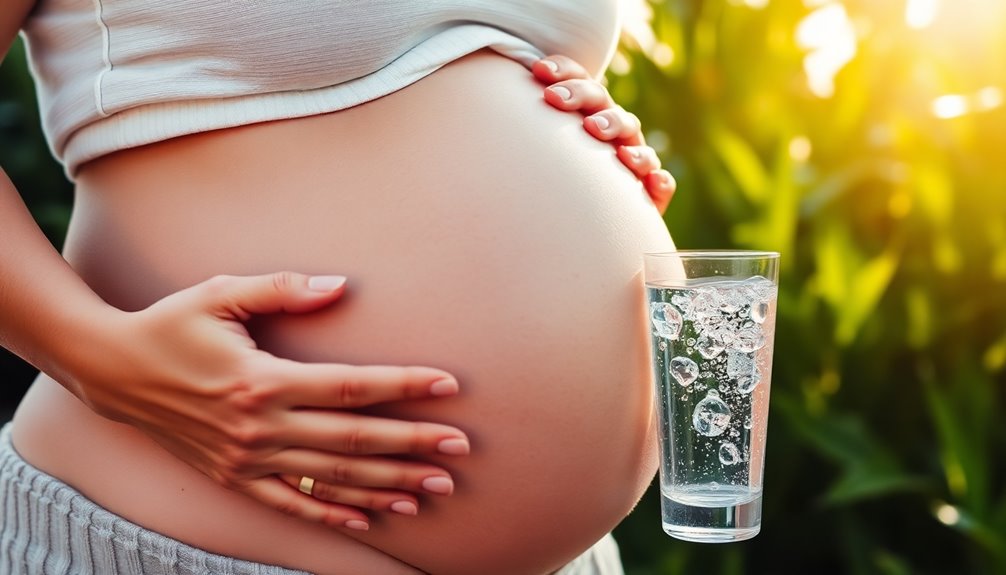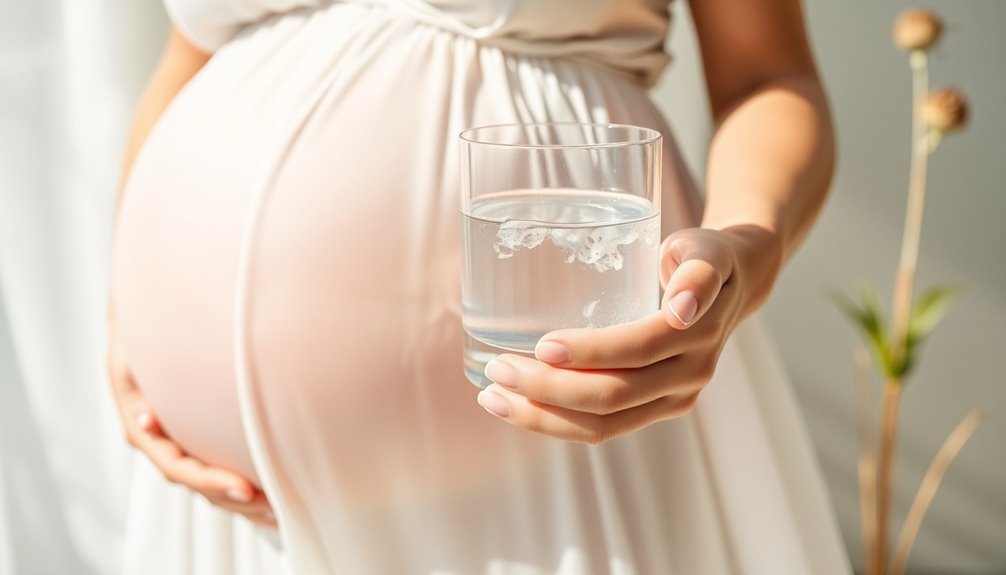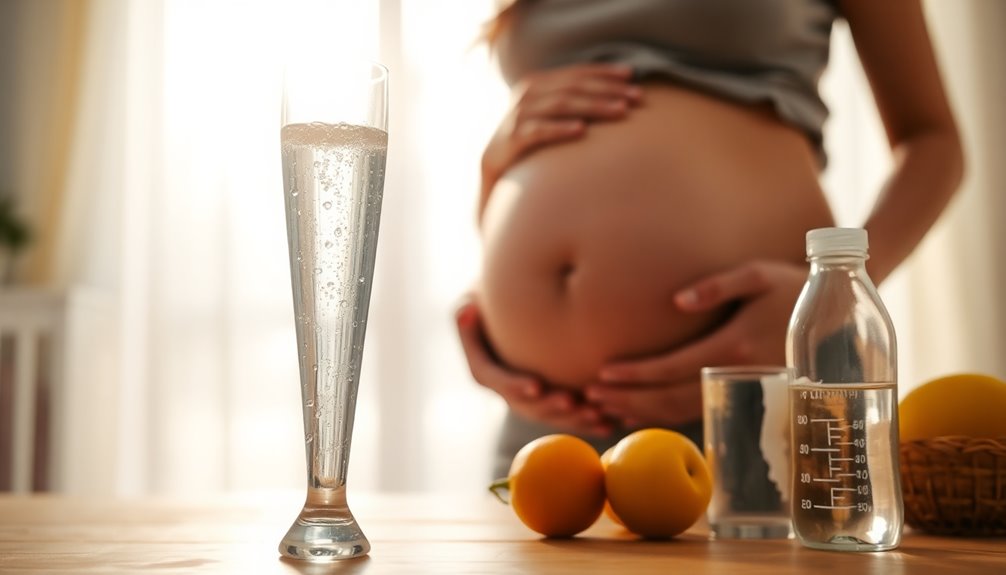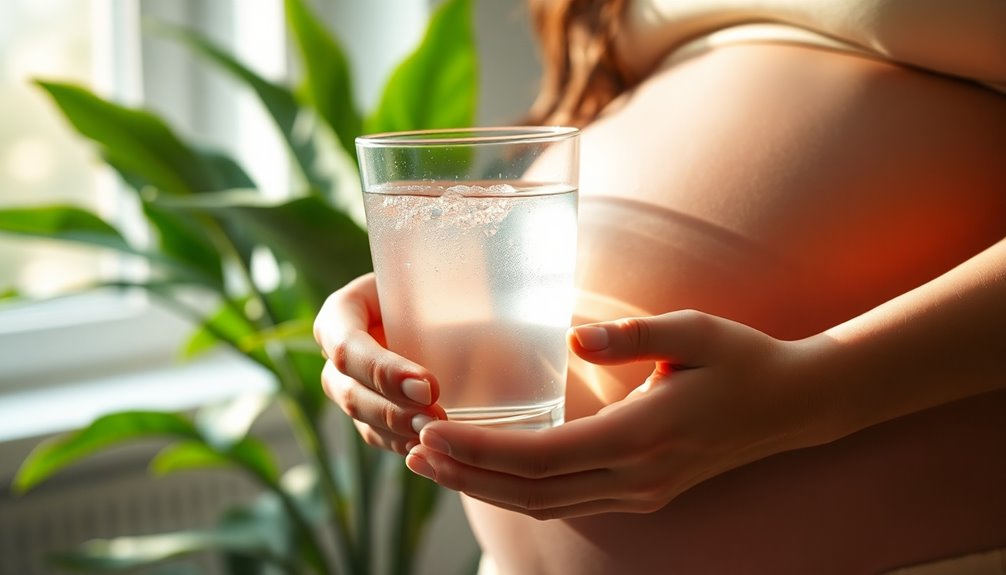Staying hydrated during pregnancy is essential for your health and your baby's development. Water helps maintain healthy blood volume and amniotic fluid levels, and it can prevent issues like constipation and urinary tract infections. You should aim for 8 to 12 cups of fluids daily, especially in the later trimesters. Dehydration can lead to serious complications, but you can easily stay on top of your hydration needs. Discover more about how hydration impacts your pregnancy.
Key Takeaways
- Staying hydrated is vital for maintaining healthy blood volume and amniotic fluid levels during pregnancy.
- Proper water intake supports the baby's development, including healthy teeth and bones.
- Adequate hydration helps prevent common pregnancy issues like constipation, swelling, and urinary tract infections.
- Signs of dehydration include increased thirst, dry mouth, and dark yellow urine, which can compromise maternal and fetal health.
- Aim for 8 to 12 cups of fluids daily, increasing during the second and third trimesters for optimal health.
Importance Of Hydration During Pregnancy

Staying hydrated during pregnancy is vital, as your body needs extra fluids to support both you and your growing baby. Hydration during pregnancy is important since water makes up about 60% of your body.
Staying hydrated during pregnancy is crucial for both you and your growing baby, as water constitutes about 60% of your body.
Aim to drink enough fluids, ideally 8 to 12 cups daily, especially in the second and third trimesters. This helps maintain healthy blood volume and amniotic fluid levels.
Proper hydration can prevent common pregnancy problems like constipation, swelling, and urinary tract infections, which can escalate into more serious issues if ignored.
Watch for signs of dehydration, such as dark urine and dizziness. Monitoring the amount of water you consume can guarantee you meet your hydration needs, promoting both maternal and fetal health.
Benefits Of Drinking Water During Pregnancy

Hydration offers numerous benefits during pregnancy that go beyond just quenching your thirst.
Drinking enough water supports your baby's development by aiding in the formation of teeth and bones while maintaining necessary amniotic fluid levels. Proper hydration reduces swelling in your feet and ankles, alleviating discomfort and promoting better circulation.
It also helps combat constipation and hemorrhoids, ensuring your digestive health stays on track. Furthermore, increasing your fluid intake dilutes urine and flushes out bacteria, greatly lowering the risk of urinary tract infections.
Finally, maintaining adequate hydration is essential for managing your increased blood volume, which supports the delivery of oxygen and nutrients to your growing fetus.
Prioritizing water intake is key to a healthy pregnancy!
Recommended Water Intake

During pregnancy, aiming for 8 to 12 cups (64 to 96 ounces) of fluids each day is essential for your health and your baby's development.
The total recommended water intake is about 2.3 liters per day to support both maternal and fetal health. Pregnant women should drink extra fluids, especially during the second trimester, where an additional 340 milliliters (11.5 ounces) is suggested, and in the third trimester, 450 milliliters (about 15 ounces) more.
Obstetricians and gynecologists emphasize that adequate hydration helps reduce the risk of complications like preterm labor.
Signs of Dehydration

Recognizing the signs of dehydration is essential for maintaining your health and your baby's well-being during pregnancy. Increased thirst, dry mouth, and cracked lips indicate that your body needs more fluid.
Pay attention to your urine; dark yellow urine suggests insufficient hydration and should be monitored closely. If you notice you're urinating fewer than four times a day, that's a warning sign that dehydration may be affecting you.
Dizziness, lightheadedness, and fatigue can also arise, impacting your overall energy levels.
Severe dehydration can lead to complications like low amniotic fluid levels and increase the risk of urinary tract infections, which could potentially trigger preterm labor.
Stay vigilant about these signs to guarantee both you and your baby remain healthy.
Tips for Staying Hydrated

Staying properly hydrated is key to preventing the complications of dehydration outlined earlier. Aim to drink 8 to 12 cups of water every day to meet your hydration needs during pregnancy.
Carry a refillable water bottle to encourage frequent sipping throughout the day. Incorporate water-rich foods, like fruits and vegetables, to boost your fluid intake while providing essential nutrients for both you and your baby.
Set reminders on your phone or use hydration apps to prompt you to drink regularly. Experiment with herbal teas or flavored water infusions using fruits like lemon or berries to make hydration enjoyable.
Finally, limit caffeine and sugary drinks, opting for milk, juice, or soups to enhance your fluid intake. Additionally, staying hydrated can play a role in early detection of health issues during pregnancy.
Serious Complications of Dehydration

While you may focus on staying hydrated during pregnancy, neglecting your fluid intake can lead to serious complications. Insufficient hydration can cause low amniotic fluid levels, negatively impacting fetal health and increasing the risk of complications during labor.
Dehydration during pregnancy may also result in kidney stones, leading to severe pain and potential medical intervention. Additionally, a lack of enough water raises the risk of urinary tract infections, which can trigger preterm labor and delivery.
Severe dehydration can cause swelling and discomfort, and may even lead to conditions like preeclampsia. It's essential to prioritize hydration to protect both your well-being and your baby's development.
Stay vigilant about your fluid intake to avoid these serious complications.
Role of Healthcare Providers

As you navigate the complexities of pregnancy, healthcare providers play an essential role in guiding you toward ideal hydration.
During regular prenatal check-ups, they assess your hydration status and address any concerns regarding fluid intake. They educate you on the importance of staying hydrated to prevent common pregnancy complications like constipation and urinary tract infections.
If you're struggling to meet your hydration needs through water alone, providers can recommend appropriate supplements or dietary adjustments tailored to your individual health needs.
Open communication with your healthcare providers empowers you to make informed decisions about your hydration, ensuring you maintain optimal fluid intake throughout your pregnancy.
Their support is vital for a healthy and comfortable pregnancy journey.
Frequently Asked Questions
How Important Is Drinking Water During Pregnancy?
Drinking water during pregnancy is essential for your health and your baby's development.
You need to stay hydrated to support increased blood volume and nutrient transport, aiming for about 8 to 12 cups daily.
Adequate hydration helps in forming your baby's teeth and bones while maintaining necessary amniotic fluid levels.
If you don't drink enough, you risk complications like constipation and fatigue, so pay attention to your body's signals and drink plenty of fluids.
What Is the Effect of Drinking Water in Pregnancy?
Drinking water during pregnancy has a significant effect on both you and your baby. It helps regulate digestion, maintain temperature, and transport nutrients effectively.
Staying hydrated supports your baby's development by ensuring proper amniotic fluid levels and increasing blood volume. It also reduces discomforts like swelling and constipation.
If you don't drink enough, you risk dehydration, which can lead to complications. Aim for 8 to 12 cups of fluids each day to stay healthy.
Does Drinking Water Affect a Baby in the Womb?
Imagine a vibrant garden, where every flower thrives on the right amount of rain.
Drinking water during pregnancy acts like that nourishing rain for your baby in the womb. It supports amniotic fluid levels, creating a protective cushion, and helps transport essential nutrients.
When you stay hydrated, your little one gets the oxygen and nourishment they need to grow strong. Plus, it reduces the risk of complications that could affect their health.
Can Not Drinking Enough Water Cause a Miscarriage?
Not drinking enough water can increase the risk of complications during pregnancy, which might indirectly contribute to miscarriage.
When you're dehydrated, it can lead to low amniotic fluid levels or urinary tract infections, both of which are concerning for your baby's health.
To support your overall well-being and reduce risks, aim for 8 to 12 cups of water daily. Staying hydrated is essential for both you and your developing baby.
Conclusion
Staying hydrated during pregnancy is vital for both you and your baby. Did you know that around 75% of pregnant women don't drink enough water daily? Imagine your body struggling to support new life while lacking the essential fluid it needs. By prioritizing your water intake, you can boost your energy, reduce swelling, and promote healthy development for your little one. So, grab that water bottle and drink up—your health and your baby's depend on it!









